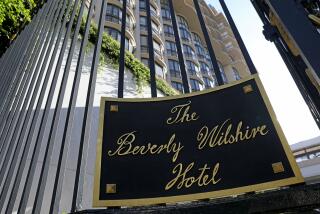Settlement Ends Long Legal Battle Over Fabulous Inns
- Share via
SAN DIEGO — Ousted management of battle-torn Fabulous Inns of America on Friday ended its two-year effort to regain control when it agreed to sell its 48% stock holdings back to the hotel company for only 1.6 cents per share.
The out-of-court settlement, agreed upon during a four-hour, closed-door meeting with Superior Court Judge G. Dennis Adams, calls for the company to pay the ousted group $15,000 for its nearly 910,000 shares of common stock and $185,000 to partly cover the former management’s legal fees. Other terms of the settlement on Friday were ordered sealed by Adams.
Fabulous Inns’ payment of 1.6 cents per share to the ousted group is far below market value; the stock closed Friday at 3 1/2 bid in over-the-counter trading.
The settlement, less than three weeks after an appellate court forever banned ousted management from controlling Fabulous Inns’ board of directors, ends one of San Diego’s longest-running and most expensive corporate control battles. Legal fees for both sides reportedly total about $2 million.
Shares to Be Retired
The ousted group’s shares will be retired, leaving the company with about 1 million shares outstanding, according to Chairman Jeffrey Krinsk, the former dissident shareholder whose claims of insider self-dealing four years ago sparked the eventual ouster.
Earlier this month, the 4th District Court of Appeals, in a 60-page opinion, overturned Adams’ previous ruling by invalidating the results of a contested shareholders’ meeting in July, 1984. During that meeting, the ousted management group--led by former Chairman Henry Maxwell, former President Walter Palmer and former director Ernest Stanley--tried to regain control of Fabulous Inns.
The appellate court ordered a new board election and ruled that the trial court should rehear the question of whether the Maxwell/Palmer group illegally obtained some of its stock in the late 1960s and early 1970s, as charged by the current management. The high court’s decision, which criticized the former management for “gross improprieties” and “flagrant dishonesty,” sparked the ousted group’s decision to negotiate a settlement, according to Fabulous Inns officials.
The agreement ends more than four years of infighting at Fabulous Inns and more than two years of formal legal battles at the small but profitable Mission Valley hotel company.
Krinsk was elected to the board of directors four years ago after he raised questions about the former management group’s involvement in a slow-selling time-share condo project in Palm Springs.
Fees for Construction Firm
The company’s stake in the money-losing project grew from 25% to 57%; Maxwell and Palmer were also partners in the venture. A construction company owned by Maxwell was paid about $180,000 in fees and an additional $313,121 in costs to develop the project.
Krinsk and other shareholders--including Chula Vista investor Frank E. Ferreira--claimed that Maxwell engaged in self-dealing, profiting on a project that was eating up company earnings.
Once on board, Krinsk called for an internal investigation of management, and hired Milberg, Weiss, Bershad, Specthrie & Lerach, a well-known shareholder lawsuit legal firm, to analyze the company. Attorney David J. Yardley revealed various conflicts of interest, eventually leading to Maxwell’s resignation.
As part of his resignation agreement, Maxwell was forced to purchase Fabulous Inns’ share in the condo project. His $1.4-million note has since been written off by current management.
Yardley was later elected to the board of directors, in a hotly contested shareholders meeting in May, 1984; a group loyal to Maxwell held a special shareholders meeting two months later in a hallway at the company’s headquarters and reelected itself.
Krinsk and Yardley said the meeting was invalid, lawsuits were filed and the issue landed in court. Current management charged that the ousted group had gained its shares illegally; the ousted group charged its adversaries with trying to take over the company.
A 10-week Superior Court hearing ensued, producing 3,000 pages of trial transcripts and 400 exhibits. Adams ruled that the special meeting was valid and the ousted directors should be seated.
The appellate court ruling earlier this month overturned Adams’ decision, invalidated the results of the special meeting and banned the former director from ever holding a majority of board seats.
From the beginning, it was Fabulous Inns’ potential more than its performance that seemed to motivate the warring factions.
A one-hotel company in Mission Valley, the company generated revenues of $1.1 million and earnings of about $120,000--which includes legal fees--for the six months ended June 30. Operating profits are expected to reach $500,000 for the year, said Krinsk.
“This means the corporation can proceed to grow revenues after proving it can grow margins and fight the fight,” said Krinsk. “We’re going to turn Fabulous Inns into a major San Diego corporation.”
More to Read
Inside the business of entertainment
The Wide Shot brings you news, analysis and insights on everything from streaming wars to production — and what it all means for the future.
You may occasionally receive promotional content from the Los Angeles Times.









